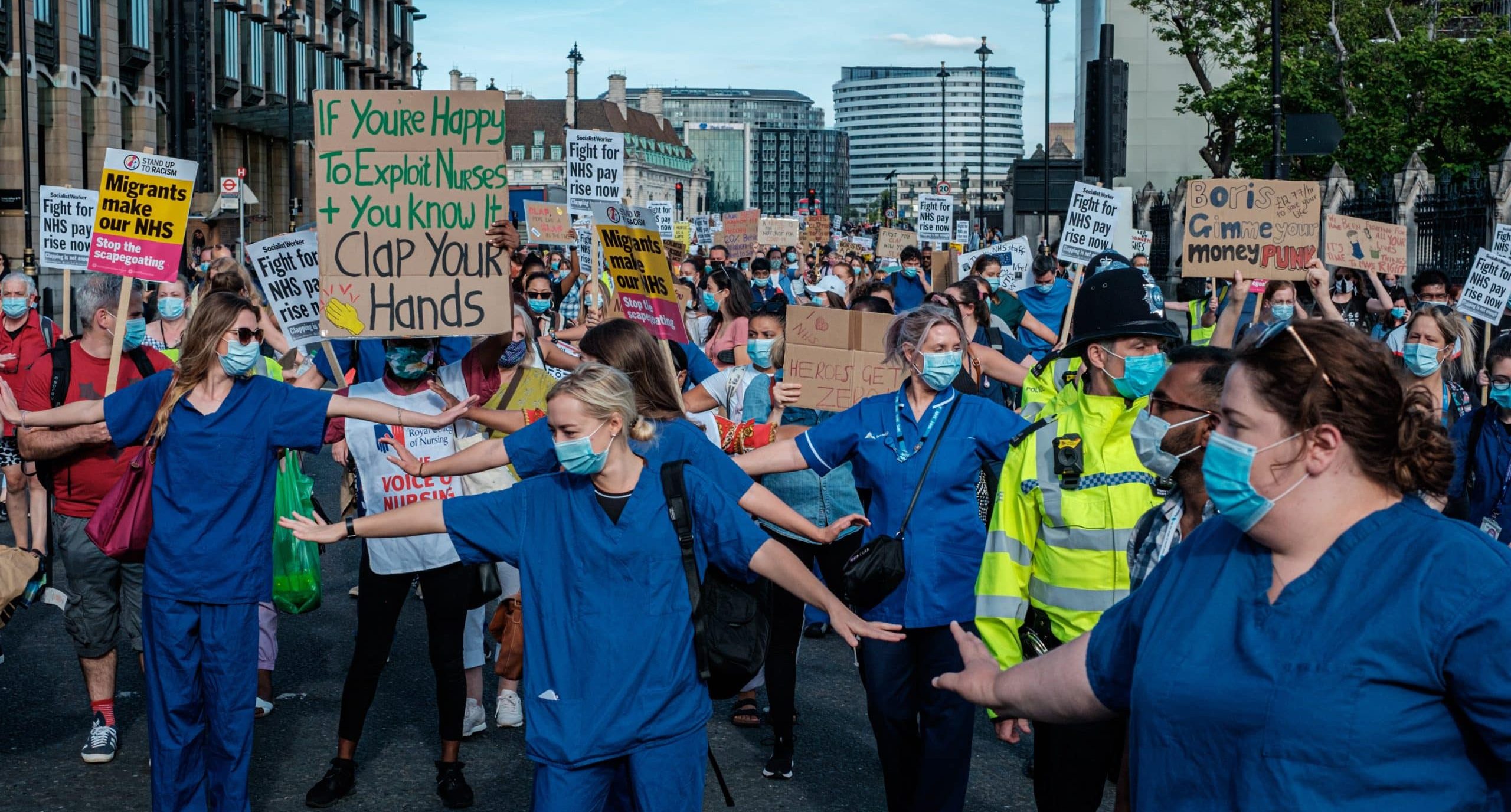 Nada Khan is an Exeter-based NIHR Academic Clinical Fellow in general practice and GPST4/registrar, and an Associate Editor at the BJGP. She is on Twitter: @nadafkhan
Nada Khan is an Exeter-based NIHR Academic Clinical Fellow in general practice and GPST4/registrar, and an Associate Editor at the BJGP. She is on Twitter: @nadafkhan
“It is commonly held that National Health Service (NHS) workers are under a moral obligation not to go on strike, because doing so might well result in people’s dying. Unless sainthood is demanded, however, this position is untenable: indeed, those most vociferously pursuing it are often those who bear the greatest responsibility, on their own grounds, for needless death and suffering.”
Bob Brecher, writing in the Journal of Medical Ethics, 19851
Strike action can be a powerful tool for change. At time of writing, the Royal College of Nursing (RCN) are balloting their members for strike action to achieve a pay rise of 5% above inflation to restore earnings and help fill nursing vacancies. This is in a rolling cast of NHS unions polling on industrial action. The BMA is planning a ballot on industrial action amongst junior doctors in January 2023. The Royal College of Midwives are also planning a four-week ballot from mid-November 2023 on industrial action over pay following a rejection of a below inflation pay award. Going on strike is a last resort and not an easy option. I know this from experience: I was one of the doctors who went on strike in 2016 following a breakdown in negotiations for the junior doctor contract. When the BMA balloted junior doctors over strike action, I was not alone; 98% of my colleagues approved strike action.
For some healthcare professionals, going on strike crosses a professional and moral line.
Should healthcare professionals ever strike? For some healthcare professionals, going on strike crosses a professional and moral line. There are absolute and relative moral objections to this question, but many of these objections rest on the assumption that going on strike violates the principle of non-maleficence and causes harm to patients.2 Previous strikes have acted as a natural experiment, and we can test this argument by looking to see whether patients were harmed during previous healthcare professional strikes. Retrospective analyses of the impact of the junior doctor strikes in 2016 demonstrated no significant impact on mortality.3 These findings are mirrored in international studies of strikes amongst healthcare professionals: patient mortality tends to stay the same or fall.4,5 It’s unclear if this is because there really is no impact on mortality, or if the health system shifts priority to critical care leading to prevent increased mortality.6 Harm to patients can be mitigated, and going on strike does not usually mean a full withdrawal of service. The Royal College of Nursing describes the fine line between disrupting a service (which is the goal of striking) and patient safety, and in any strike action the RCN emphasises that nurses must follow the ‘life preserving care model’ and prevent permanent patient disability. This means that services that preserve life and prevent permanent disability are exempt from RCN strike action, but defining these services is not straightforward. Over the course of the first junior doctor three strikes in early 2016, emergency care was still provided, but in April 2016, junior doctors withdrew both routine and emergency cover. The impact on healthcare provision was greatest when emergency cover was withdrawn, especially on the number of cancelled outpatient appointments which rose to almost 67%.3 Patient deaths still didn’t increase during the 2016 industrial action even when emergency care was withdrawn, but of course, mortality is not the only way to measure harm to patients. The inconvenience of cancelled appointments or elective surgeries has a clinical, practical and emotional impact on patients. But is this present harm acceptable against the greater good of going on strike? It depends if you can justify strike action as acting to prevent future patient harm, and therefore justify strike action under a utilitarian model as a moral imperative.
Mr Hunt is warning of ‘difficult’ spending cuts to come and the NHS remains in the firing line, potentially leaving little resource for real term salary increases amongst NHS staff.
Underlining this discussion is motivation, and understanding why numerous public sector and NHS worker unions are balloting their members for strike action. A decade of austerity imposed by the Conservative government to control public sector debt by cutting spending has impacted on the real terms pay for NHS staff, not least by the government-imposed seven-year public sector pay cap which ended in 2017. Nurses, health visitors and midwives have all seen real term falls in basic pay; between 2011-2021, the average basic earning for an NHS nurse has fallen by 5% in real terms and NHS pay awards are not keeping up with inflation.7 The BMA makes the same argument with relation to junior doctor salaries; real-terms pay for junior doctors has fallen by 26.1%% since 2008. If the main motive for striking is pay, is a strike still justifiable? Or in other words, is it justifiable to go on strike for any position other than preventing direct harm to patients? Back to that utilitarian argument: the RCN and the Royal College of Midwives draw a direct correlation between pay and staffing; and argue that a pay uplift is necessary to retain and recruit staff in order to safely look after future patients. There have been dramatic falls in the full-time equivalent staffing of midwives and vacancy rates for registered nurses have increased between 2015 and 2022. Salary is a main driver behind staff recruitment and retention in nursing. In a survey of RCN members, the main reason for considering leaving nursing was dissatisfaction with pay levels which aren’t keeping up with the cost of living and a perceived failure to reward nurses fully for their work.7 The BMA argue that unless pay is not restored to meet inflation, exhausted and demoralised doctors will leave the NHS for better paid jobs with better working conditions. It’s unclear how much of the current recruitment and retention crisis is just down to pay cuts; workforce issues in the NHS are complex and include both job-related and individual factors. Can we justify industrial action and current patient harm to potentially prevent future patients from harm? This is probably the question those under ballot will need to ask themselves.
The UK government is facing down an economic crisis. Jeremy Hunt, well remembered by this former striking junior doctor for his hardline strategy as Health Secretary is (currently) our new Chancellor. Mr Hunt is warning of ‘difficult’ spending cuts to come and the NHS remains in the firing line, potentially leaving little resource for real term salary increases amongst NHS staff. With balloting ongoing amongst nurses, midwives and doctors, this government is on a collision course with unions over strikes. As Bob Breacher suggests, we need to think hard about who really bears the greatest responsibility for preventing needless patient harm in today’s NHS.
References
1. Brecher R. Striking responsibilities. J Med Ethics. 1985;11(2):66-9. https://jme.bmj.com/content/medethics/11/2/66.full.pdf
2. Toynbee M, Al-Diwani AA, Clacey J, Broome MR. Should junior doctors strike? J Med Ethics. 2016;42(3):167-70.
3. Furnivall D, Bottle A, Aylin P. Retrospective analysis of the national impact of industrial action by English junior doctors in 2016. BMJ Open. 2018;8(1):e019319.
4. Cunningham SA, Mitchell K, Narayan KM, Yusuf S. Doctors’ strikes and mortality: a review. Soc Sci Med. 2008;67(11):1784-8.
5. Essex R, Milligan W, Williams G, Weldon SM. The impact of strike action on patient morbidity: A systematic literature review. Int J Health Plann Manage. 2022;37(3):1311-26.
6. Metcalfe D, Chowdhury R, Salim A. What are the consequences when doctors strike? BMJ. 2015;351:h6231.
7. Buchan JC, A.; Bazeer, N.; Shembavnekar, N.; Kelly, E. Where next for NHS nurses’ pay? : The Health Foundation; 2022 [Available from: https://www.health.org.uk/publications/long-reads/where-next-for-nhs-nurses-pay
Featured photo by Ehimetalor Akhere Unuabona on Unsplash







Carter Singh is a GP in Nottinghamshire. He is the chairman of the Nottinghamshire LMC and a national council member of the RCGP. The decision…